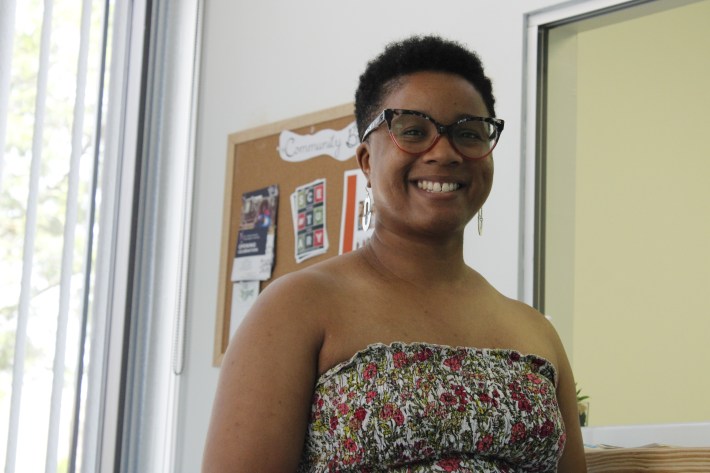Black Women Leading Chicago’s Mental Health Movement Come Together To Encourage Other Black Women To Prioritize Care

[ad_1]
WEST LOOP — Dozens of mental health professionals and advocates will gather for a panel discussion this week, and organizers hope it will spur more Chicagoans to join the movement for mental health care access and awareness among Black women.
The Caring for Her conversation and mixer is 6 p.m. Thursday at 811 W. Fulton Market in Fulton Market. Local therapists, social workers and community leaders will discuss the mental health resources available — and the resources still needed — for Black women and girls.
Psychologist and author Inger Burnett-Zeigler, therapist Lisa Butler, Ladies of Virtue founder Jamila Trimuel, Cent(her)ed Collective founder Brittney Autry-Cole, NAMI Chicago Policy Director Rachel Bhagwat and Coalition on Urban Girls founder Sherida Morrison are the evening’s panelists. Poet and author Pam Johnson Davis will perform.
About 100 people have registered for the event, which was nearly at capacity as of Wednesday. You can register for one of the remaining seats through Eventbrite.
The panel is hosted by Sista Afya Community Mental Wellness, 1817 E. 71st St., a South Shore-based mental health resource centering Black women.
“All of the panelists have a direct tie to Chicago and have provided direct care and services, or have been advocates in some way to … improve the mental wellbeing of Black women and girls,” said Camesha Jones, Sista Afya executive director. “It was important for me to bring women together who not just talk the talk, but walk the walk and are … leaders and visionaries of this work as well.”
 Credit: Maxwell Evans/Block Club Chicago
Credit: Maxwell Evans/Block Club ChicagoCaring for Her is a pioneering affair in Chicago, as few — if any — mental health events of this size explicitly center Black women, the panelists said.
“The opportunity to focus on Black women and girls instead of people of color at large, or Black people at large, is really intentional,” Autry-Cole said. Her Cent(her)ed Collective promotes mental wellness through therapy and retreats and organizes healing programs for middle schoolers on the West Side.
The dozens of people who registered to attend “makes me as a Black woman, as a part of this community, feel like people care and want to be a part of the change,” Autry-Cole said.
Such a targeted event is timely, given the myriad of crises Black women face in this moment, Butler said. She’s a licensed social worker who provides therapy to women across the city and region.
The COVID-19 pandemic, loss of reproductive rights, neighborhood violence and the stress of community advocacy are taking their toll on Black women’s bodies across Chicago, Butler said.
Caring for Her allows attendees to take an evening to process their experiences.
“There needs to be more spaces for us to sit with each other and to talk about what’s important to us, about our values, about whatever issues we’ve had — to be able to process that so we can get on the road to healing,” Butler said.
The Caring for Her speakers will discuss traditional talk therapy and will explore beyond that to discuss yoga, sound healing, napping and other forms of physical, emotional and spiritual healing.
They’ll also discuss the barriers that exist for Black women’s mental health care. Barriers include costs, stigmas, the closure of mental health facilities and insufficient funding for smaller, community mental health programs, organizers said.
Despite the obstacles, there is a thriving community of Black women providers working to overcome them, as evidenced by the deep roster of panelists, Jones said.
Sista Afya offers free and sliding-scale therapy, while Ladies of Virtue incorporates mental health practices into its girls’ mentoring program.
Burnett-Zeigler works to end the social stigma around receiving help, and the Coalition on Urban Girls operates a hotline for young women who are in immediate danger or in need of gender-specific care.
“Our experiences as Black women — our history of resilience and needing to be strong —has gotten in the way, sometimes, of us seeking help or seeking care,” Jones said. “Many people looked at therapy as a luxury … or [as being] for people with severe mental health issues. Now we’re starting to see that mental health treatment is something we all can benefit from.”
Though Caring for Her is only for one night, its gathering of so many talents and perspectives in one space can start and sustain momentum for a citywide movement, panelists said.
“I’m hopeful that this event will kick off other events and other spaces [around] the idea that we need to keep Black women and girls on the list of priorities at this time,” Butler said. “We should’ve been doing that. But I’m hopeful this will kick that off, and we’ll start seeing more stuff like this in the future.”
Listen to “It’s All Good: A Block Club Chicago Podcast”:
[ad_2]
Source link
